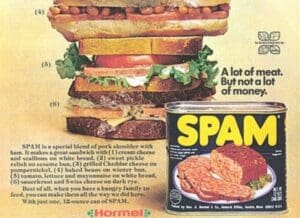Microwaving the Dinosaurs: Have We Hit Peak Packaged Foods?

World War II gave us industry like we’d never seen it before. More than just bullets and machines—the factory revolutionized food, too. Following the war, 1950s Americana was defined by the ersatz foods of modernity: lime-green Jell-O, Betty Crocker cake mixes, canned vegetables, frozen TV dinners, Tang. Fresh fruits and vegetables were quaint old-world unnecessary reminders of our uncivilized past.
We embraced the quicker meal, with less prep and mess to clean up as a marker of our foray into a New World paved with neatly storable boxes, cans and tubes of fresh factory-pressed food. Yummy. But the effects of these foods have created the opposite image of what a futuristic society would look like. Instead, we’re plagued with the significantly undignified rising rates of obesity, diabetes, heart disease; and destruction of our farmers’ rustic connection with the earth, pollution, deforestation, genetic modification. And, it finally seems as though we’re getting the message as a new study finds sales of packaged foods are steadily declining.
Food Business News recently reported that sales in 14 of the top 20 packaged food categories declined by three percent or more in the last year. Categories include baby formula, bread, soup, canned and jarred fruit, etc. You certainly wouldn’t notice this by walking into any supermarket where aisles are modern day shrines to the packaged food gods.The multinational brand conglomerates that own your favorite boxes of cereals, cans of soup, frozen pizzas and candy bars continue to buy emerging brands still experiencing upward growth to boost the parent company’s value and satisfy shareholders and board members hunger for profits. They push cheaper products out through giants like Wal-Mart and Target and strike deals with dollar stores to move massive volume in secondary markets as grocery consumers move away from the pellucidity of the trademarked packaged foodstuffs and opt instead for fresher foods.
The organic food industry, which surpassed the $30 billion mark in sales last year—a 9.5 percent increase over 2010—saw more than half of that growth coming from the sales of fresh fruits and vegetables and not from packaged foods. And while organic fruits and vegetables may seem like an indulgence for the elite health food store consumer, even the nation’s poorest are beginning to see through the illusory affordability of packaged foods as a deception proffered by the packaged food industry and are returning to fresh foods as local farmers markets crop up all across the country. The reach of preparing a meal out of fresh ingredients goes farther on less money than the nutritionally-inferior packaged alternatives, and, it seems, everyone is figuring this out.
It isn’t just a result of the lingering recession, either. According to James Richardson, Senior Vice President of the Hartman Group, a consumer research firm, “an aggregate shift away from packaged food began long before now and even long before the recession began. If we look at the volumetric trends from 2003 until 2009 (something almost no one ever does), we see that fresh food (i.e., raw fruits, raw vegetables, grains) have been steadily growing while packaged food (everything in a package) has been steadily, inexorably declining.”
Partial credit can be given to the efforts of a number of health organizations and individuals like Michelle Obama, Jamie Oliver and Mark Bittman who have emphasized not only the irrefutable necessity of eating healthy foods, but also the ease in doing so, both in the kitchen and in the bank account. From the White House garden to Oliver’s school lunch makeovers and the myriad cooking shows demonstrating fast, healthy and flavorful meal ideas, Americans of all income levels are getting back to basics.
Frequent outbreaks of foodborne illnesses, food recalls and issues like Pink Slime don’t help the packaged food category, either. And then of course, there are genetically modified ingredients. The FDA just received the most signatures in the agency’s history on the issue of labeling GMOs. California and Vermont are close to becoming the first states to mandate labeling of all food products containing the divisive ingredients. While the rest of the modern world requires labeling of GMOs or bans them altogether, as much as 80 percent of the packaged foods sold in the U.S. contain unlabeled genetically modified foods, namely soy, corn and canola.
Packaged foods have become downright scary.
Marketers in the 1950s appealed to the sensibility of the exhausted stay-at-home housewife. Laura Shapiro,author of Something from the Oven, sums it up: “Soon no excuse at all was needed, and stories simply promised ‘Hot breads—in a jiffy!’ ‘Quick fix desserts!’ ‘Suppers that beat the clock!’ Here was one claim that manufacturers could stand behind; and when it came to some foods, this was probably the sole claim that could be made with any credibility.” And while the world is a drastically different place now—especially for women—packaged foods have evolved in an essentially insulting mutation, appealing to our love for the sensational and ridiculous (hotdog stuffed pizza crust, you take the cake), offering gimmick and schtick rather than inexpensive and easy ways of meeting our nutritional needs. Gone are the novel packaged food products that were at the very least, logical: minute rice, cans of vegetables, powdered gravy. We’ve moved on to Doritos Locos Tacos, fudge-covered Oreos and Diet Mountain Dew.
The industrial age is over. We’ve moved on to technology to further fuel our sense of community and to make the world a more accessible and improved place. Despite the number of Americans suffering from food-related illnesses, we are getting healthier while the packaged food industry is perpetuating the preposterous in desperate attempts to stay alive. But if the industry has any sense of dignity, it will hopefully die-off with grace.
Keep in touch with Jill on Twitter @jillettinger
http://www.npr.org/templates/story/story.php?storyId=1842717
http://www.businessnewsdaily.com/2404-organic-industry-healthy-growth.html
http://www.hartman-group.com/hartbeat/deny-and-perish
Image: jbcurio

